research & reports
research & reports
UK’s compliance with the UN Convention on the Rights of the Child: Report from the Joint Committee on Human Rights
In advance of the United Nations Committee on the Rights of the Child's consideration of how the UK complies with the Convention on the Rights of the Child (during autumn 2015), the UK Parliament's Joint Committee on Human Rights has published a short report outlining areas of concern. The report states: Again, we hope that our successor committee will have an opportunity to scrutinise the issue of children serving in the armed forces in the light of the UN Committee's concluding ovservations which will be delivered in 2016.
A critical response to ‘The British Armed Forces: Learning Resource 2014’
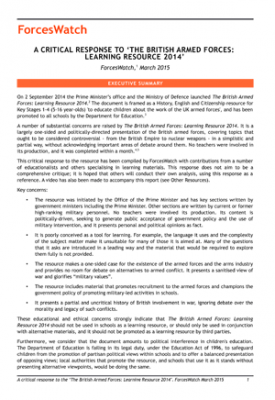
The report is published in conjunction with the video The British Armed Forces: Propaganda in the classroom? produced by Quaker Peace & Social Witness. This report explains why the British Armed Forces Learning Resource (published in September 2014 by the Prime Minister's Office) is a poor quality educational resource, and exposes the resource as a politically-driven attempt to promote recruitment into the armed forces and “military values” in schools.
International Standards on Conscientious Objection to Military Service
Published by the Quaker United Nations Office in November 2011, this booklet reflects recent changes in international law and practice that indicates that recognition of conscientious objection to military service as a human right is now stronger than ever.
Armed Forces Visits to Secondary Schools in Scotland
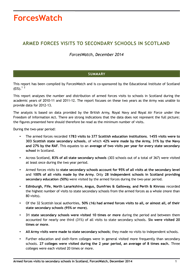
The report, compiled by ForcesWatch, is based on figures obtained under the Freedom of Information Act from the armed forces on their visits to Scottish schools. It has been co-sponsored by the Educational Institute of Scotland which has expressed concerns that some armed forces visits may have a recruitment purpose. Also see Armed forces visits to schools in Scotland: An update for 2016-2017
How ought war to be remembered in schools

David Aldridge examines the reasons usually advanced for involving children and young people in commemorating the war dead, and finds many of them wanting. He critically examines the high profile in schools of charities, like the Royal British Legion, with vested interests in certain kinds of commemoration. And he argues forcefully for a justification of remembrance in schools that requires a major rethink of established rituals and practices.
Security for the future: In search of a new vision
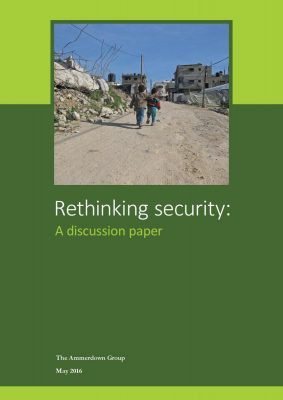
A group of UK peacebuilding professionals invite you to participate in a new civic conversation about alternatives to the current approach to national security. Here they outline their concerns about the existing model, and offer a different vision for the future, welcoming input from anyone who wishes to engage in this debate.
Army Recruitment: Comparative cost-effectiveness of recruiting from age 16 versus age 18
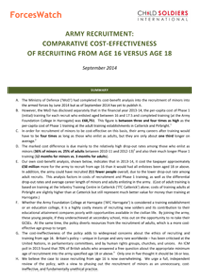
This paper, published by ForcesWatch and Child Soldiers International, shows that the taxpayer would save approximately £50 million per annum if the minimum age of recruitment were raised to 18; it would also result in the army needing to find about 211 fewer new recruits annually, based on current numbers joining the trained strength. The paper concludes that the case to cease recruiting from age 16 is now overwhelming and urges a full, independent review of the policy, with a view to phasing out the recruitment of minors as an unnecessary, cost-ineffective, and fundamentally unethical practice.
Gender & Militarism: Analyzing the Links to Strategize for Peace
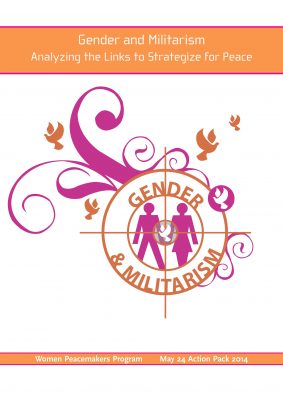
Gender and Militarism: Analyzing the Links to Strategize for Peace, published by the Women Peacemaker Programme in 2014, is a resource with contributions from many individuals and organisations, including some of the foremost researchers in the area.
The Last Ambush? Aspects of mental health in the British armed forces
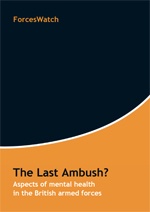
This report from ForcesWatch, shows that young soldiers recruited from disadvantaged backgrounds are substantially more likely than other troops to return from war experiencing problems with their mental health. It calls for the policy of recruiting from age 16 to be reviewed so that the greatest burden of risk is not left to the youngest, most vulnerable recruits to shoulder.
Young age at Army enlistment is associated with greater war zone risks: An analysis of British Army fatalities in Afghanistan
This paper, published by ForcesWatch and Child Soldiers International, indicates that the risk of fatality in Afghanistan for British Army recruits aged 16 and completed training has been twice as high as it has for those enlisting at 18 or above.
